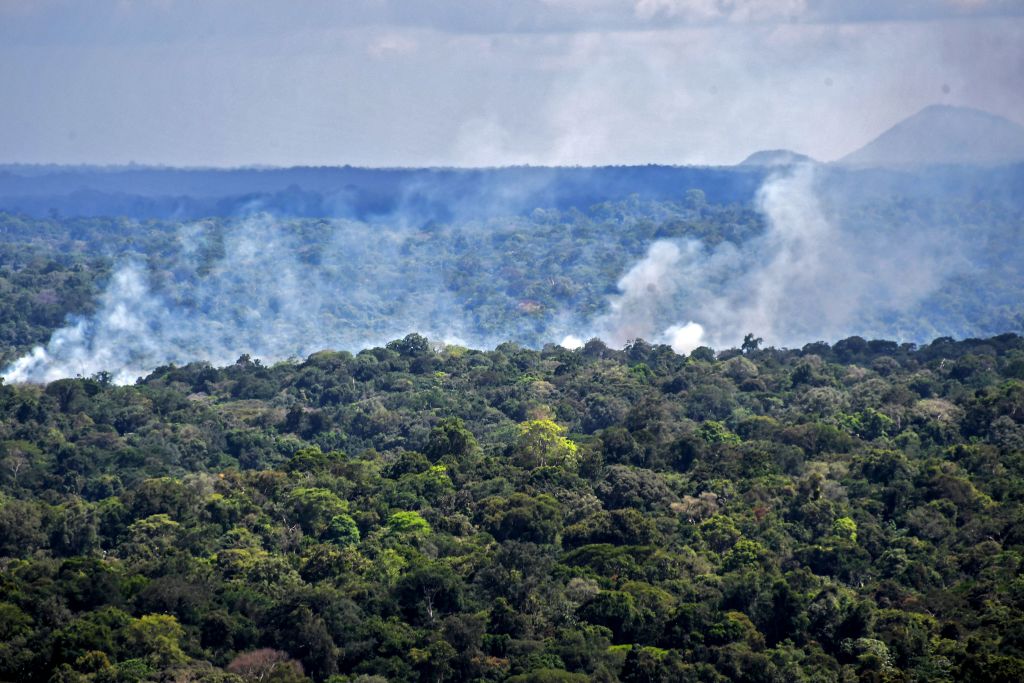Brazil offers to cut deforestation by 40 percent in exchange for $1 billion from U.S.


A free daily email with the biggest news stories of the day – and the best features from TheWeek.com
You are now subscribed
Your newsletter sign-up was successful
Brazil says it will cut back on deforestation — for a price.
Brazilian President Jair Bolsonaro has sent a proposal to the Biden administration that involves reducing deforestation by 40 percent in exchange for $1 billion, The Wall Street Journal reports. Bolsonaro is often criticized as a "negligent steward" of the vulnerable Amazon rainforest, the Journal notes, but he and others, including residents of the Amazon region, have argued the only way to save the rainforest is by funding "nascent bio-industries" like fish farming "that would provide alternatives to poor farmers who slash and burn to raise crops and cattle."
Ricardo Salles, Brazil's environment minister, said $1 billion is a "reasonable" amount, especially since President Biden mentioned during his campaign last year that he would work to gather $20 billion from around the world to help Brazil fight forest destruction. Salles told the Journal that one-third of the money would finance "specialized battalions" to enforce environmental laws, while the rest would go to the aforementioned sustainable economic activities.
The Week
Escape your echo chamber. Get the facts behind the news, plus analysis from multiple perspectives.

Sign up for The Week's Free Newsletters
From our morning news briefing to a weekly Good News Newsletter, get the best of The Week delivered directly to your inbox.
From our morning news briefing to a weekly Good News Newsletter, get the best of The Week delivered directly to your inbox.
Per the Journal, Brazil believes foreign aid would end deforestation by 2030, but not everyone is buying the talk. "The [Brazilian] government's credibility to collect funds from other governments is entirely damaged," Carlos Rittl, a senior fellow at the Institute for Advanced Sustainability in Germany, told the Journal. "This is a blackmail discourse."
Bolsonaro will be one of around 40 heads of state to participate in a virtual climate summit hosted by Biden on Thursday and Friday. Read more at The Wall Street Journal.
A free daily email with the biggest news stories of the day – and the best features from TheWeek.com
Tim is a staff writer at The Week and has contributed to Bedford and Bowery and The New York Transatlantic. He is a graduate of Occidental College and NYU's journalism school. Tim enjoys writing about baseball, Europe, and extinct megafauna. He lives in New York City.
-
 The environmental cost of GLP-1s
The environmental cost of GLP-1sThe explainer Producing the drugs is a dirty process
-
 Greenland’s capital becomes ground zero for the country’s diplomatic straits
Greenland’s capital becomes ground zero for the country’s diplomatic straitsIN THE SPOTLIGHT A flurry of new consular activity in Nuuk shows how important Greenland has become to Europeans’ anxiety about American imperialism
-
 ‘This is something that happens all too often’
‘This is something that happens all too often’Instant Opinion Opinion, comment and editorials of the day
-
 The plan to wall off the ‘Doomsday’ glacier
The plan to wall off the ‘Doomsday’ glacierUnder the Radar Massive barrier could ‘slow the rate of ice loss’ from Thwaites Glacier, whose total collapse would have devastating consequences
-
 Can the UK take any more rain?
Can the UK take any more rain?Today’s Big Question An Atlantic jet stream is ‘stuck’ over British skies, leading to ‘biblical’ downpours and more than 40 consecutive days of rain in some areas
-
 As temperatures rise, US incomes fall
As temperatures rise, US incomes fallUnder the radar Elevated temperatures are capable of affecting the entire economy
-
 The world is entering an ‘era of water bankruptcy’
The world is entering an ‘era of water bankruptcy’The explainer Water might soon be more valuable than gold
-
 Climate change could lead to a reptile ‘sexpocalypse’
Climate change could lead to a reptile ‘sexpocalypse’Under the radar The gender gap has hit the animal kingdom
-
 The former largest iceberg is turning blue. It’s a bad sign.
The former largest iceberg is turning blue. It’s a bad sign.Under the radar It is quickly melting away
-
 How drones detected a deadly threat to Arctic whales
How drones detected a deadly threat to Arctic whalesUnder the radar Monitoring the sea in the air
-
 ‘Jumping genes’: how polar bears are rewiring their DNA to survive the warming Arctic
‘Jumping genes’: how polar bears are rewiring their DNA to survive the warming ArcticUnder the radar The species is adapting to warmer temperatures
